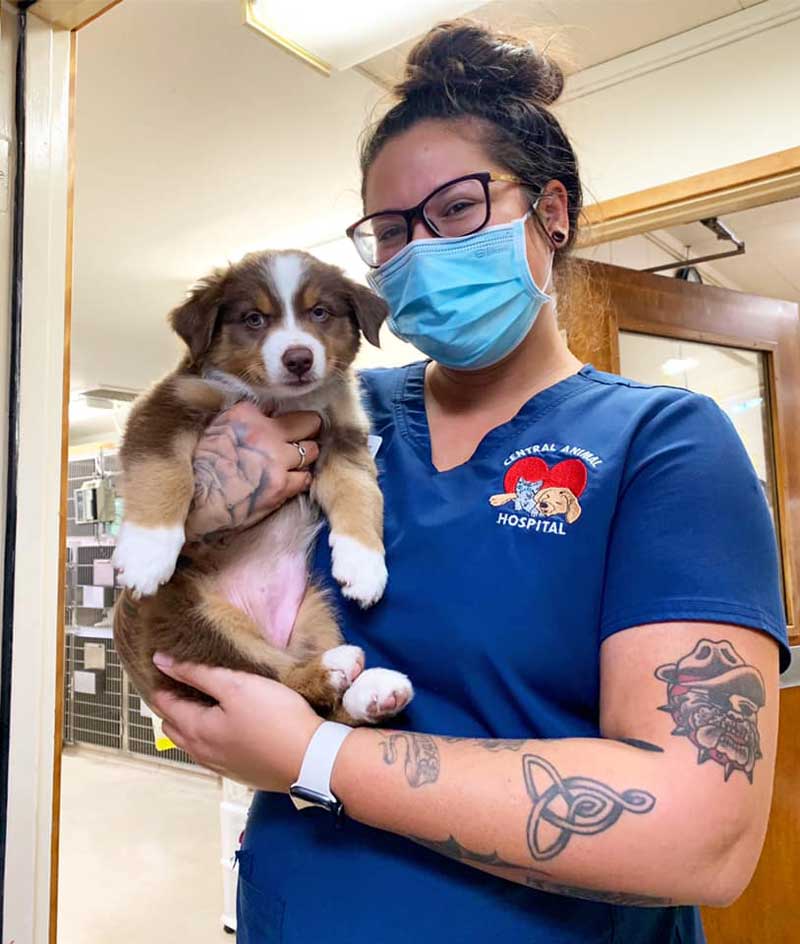Dental FAQs
Answers to some of your most common Dental Care questions:
Is it safe for my pet to undergo anesthesia?
We will fully examine your pet for any underlying disorders and perform pre-anesthetic blood screening prior to the cleaning. Your pet will be kept comfortable on a warming blanket and given continuous intravenous fluids and vital signs will be constantly monitored throughout the procedure. While no one takes anesthesia lightly, the risk from untreated dental disease is far greater than the risk from well-managed anesthesia.
What are plaque and tartar and why are they such a big deal?
Dental plaque is a constantly forming sticky film which covers the teeth, containing large amounts of bacteria. If left unchecked, it becomes mineralized and turns into a hard yellow-brown crust called tartar (or calculus). The presence of tartar irritates, inflames, and destroys the gums, sets up ideal conditions for continued infection, and causes eventual loss of tissue and bone supporting the tooth.
What is a "Complete Oral Health Assessment and Treatment"?
The Veterinarian start by performing a complete oral assessment of you're pet's mouth. We are looking for any abnormalities of the tongue, palate, cheeks, and throat. We then chart all teeth and look for missing, broken, loose, or worn teeth, gum recession, periodontal pockets, and infection. We use an ultrasonic scaler and hand-scaling instruments to remove all tartar and plaque both above and below the gum line. The teeth are then polished to retard the development of new tartar. Full mouth radiographs (x-rays) will be taken to enable us to see what is going on under the gumline (where 60% of the tooth lives!!!). We provide you with a full report when you pick up your pet and offer thorough instructions and suggestions for preventive home dental care.
Can I just brush my pet's teeth or give dental chews to remove the tartar?
Once formed, tartar can only be completely removed by scaling the teeth under anesthesia. The tartar beneath the gum line causes the most significant disease and can only be removed in this way. This type of professional cleaning is similar to what a dental hygienist does for our teeth at the dentist's office.
My groomer offers "dental cleaning". Is that the same as what you are recommending?
No! Effective removal of tartar and plaque can only be done with specialized dental equipment to scale and polish each tooth and must be done under anesthesia. Your groomer's services can be a valuable adjunct to your home care after a complete Dental Scale and Polish has been performed by the veterinarian.
My pet's teeth don't seem all that bad. What if I wait?
The tartar will get worse. As the oral disease progresses, your pet may experience bleeding gums, pain, infections, and irreversibly weakened bone structure around the teeth. Future dental cleanings will become more complicated; x-rays, extractions, and antibiotic therapy may become necessary, and the overall expense will be greater - both financially, and to your pet's general comfort. The doctor is recommending a cleaning now because there is visible tartar in your pet's mouth and we want to prevent any disease from developing.
How often will my pet need a Complete Oral Health Assessment and Treatment?
This can vary quite a bit due to various factors such as the age and breed of your pet. Smaller dogs and certain breeds of cats tend to develop periodontal disease more quickly. Regular home dental care is effective at prolonging the interval between professional cleanings. Still, some pets need a complete oral health assessment and treatment on an annual basis, some more frequent and a few get by with less often.
What can I expect if surgical extractions are needed?
If surgical extraction is recommended, it means that your pet will actually be better off without the affected tooth than with it left in place! We charge for surgical extractions by the time and expertise required to successfully remove the tooth. Any surgical extraction will be followed by a dental radiograph to ensure complete removal. If surgical extractions are performed, we will also administer pain medications and may send home additional medications for at-home care.
What will it cost?
The cost of a complete oral health assessment and treatment varies with the severity of the dental disease. We will prepare a detailed written treatment plan of the charges for your approval prior to reserving the appointment. We are able to provide you with a breakdown of exactly what goes into our package, so you can compare apples to apples with services that may be offered in other locations.
Go to the Dental Care page >

.png)